Coatings for Warehouses and Distribution Centers
If you manage a warehouse or packaging facility, you know your floors can take a lot of abuse—from heavy machinery, constant foot traffic, and the realities of day-to-day operations.
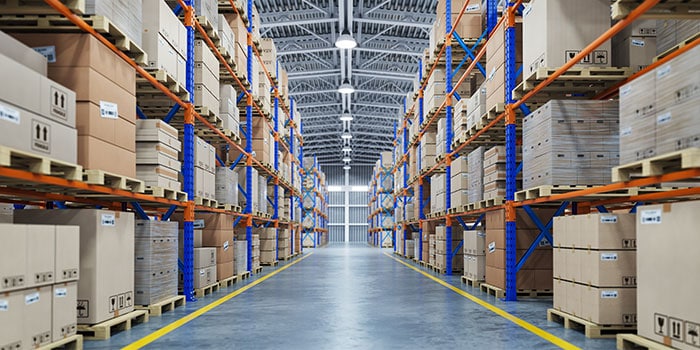
It’s important to keep your floors well-maintained for the safety of your employees and to keep them attractive-looking to instill pride in your organization.
CPC Floor Coatings offers a variety of warehouse flooring solutions, tailored to the needs of your facility and your industry. We can recommend and execute a number of flooring options to keep your warehouse clean, safe, and efficient:
Let's solve your flooring problems together.
High-Gloss Concrete Polishing
High-gloss concrete polishing improves a floor's durability and maintenance. In a commercial warehouse, a polished concrete floor can withstand spills, heavy forklifts, and high-volume foot traffic. The mechanical process of polishing concrete actually increases the density and hardness of your warehouse floor.
It's easy to maintain polished concrete, too. Regular dry mopping and an occasional touch with the wet mop should keep these floors good to go.
Many companies choose polished concrete for their appearance along with their easy maintenance. You can dye polished concrete if you like or add emblems, logos, or safety markings. And since these floors last practically forever, they're a great way to save money and help sustain the environment at the same time.
Give your floors an attractive architectural shine while also making them stronger with high-gloss concrete polishing.
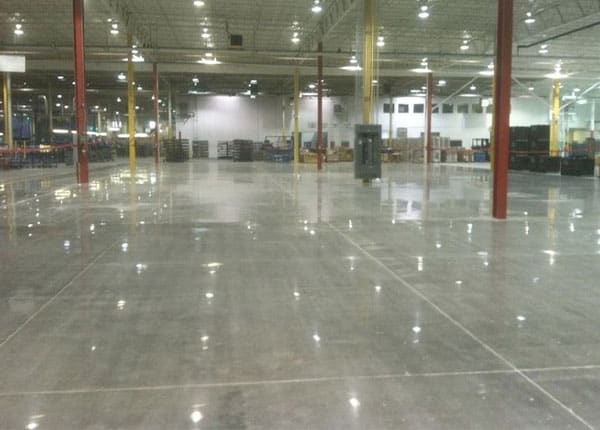
Dust-Free Concrete Polishing
What if you handle food or beverage products, though? Dry polishing methods are not legal in these facilities. So how can concrete polishing work for you?
In this case, you can opt for the wet polishing method to avoid the possibility of dust contamination. This method creates a lower-luster shine but with all the strength that traditional polishing offers. Even better, it's less expensive than a dry polish.
In the dry-polish method, a commercial-scale polishing machine uses a diamond-grit disk to grind down the floors. Each application requires a finer-grit disk to get the floor smoother and smoother. Most of the dust gets vacuumed up during the process, but between applications, technicians use water to help keep things clean.
A wet-polish, however, uses a slurry to capture dust and keep it out of the air. This method employs the same diamond-grit disks as a dry polish, but it produces a less shiny end result. The wet-polish process uses a propane-fueled machine, which is better for the environment, but it often can't get into small spaces and crevices like a hand-held dry polisher can do.
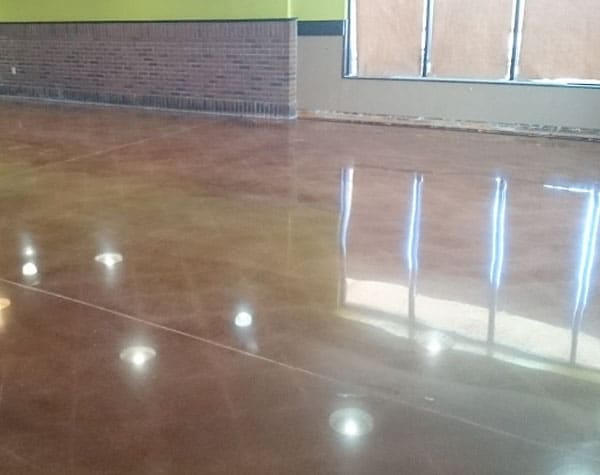
Epoxy Floor Coating
Epoxy floor coatings can withstand the tough conditions of a warehouse. A two-part system composed of polymer resins and hardeners, epoxy forms a stiff plastic that's strong, durable, and bonds well to the substrate.
The versatility of epoxy makes it one of the most popular floor coating options on the market.
Warehouse managers favor epoxy because it can stand up under nearly anything. At ¼" thick, epoxy can bear heavy machinery without cracking. Warehouses with gentler traffic can go for a thinner coat and still get the same results.
Installers sometimes fill epoxy with quartz chips or flakes for decoration. And in some industries, an electro-static charge resistant epoxy floor can reduce flammability.
You can safely and affordably protect your floor from spills and abrasions with a durable and attractive epoxy coating.
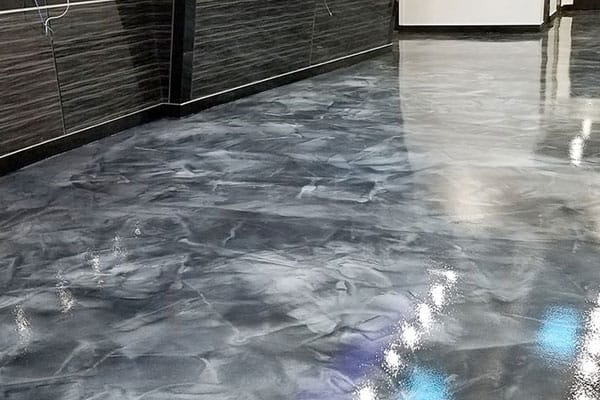
Floor Striping for 5S Organization
According to the 5S principles of workspace organization, employees and visitors should understand a room's workflow at a glance.
Floor striping is an affordable, simple way to quickly and intuitively communicate traffic patterns to warehouse employees. It improves flow, minimizes accidents, establishes consistency, and even bumps up morale. Floor striping can also help warn employees about hazardous areas before an unfortunate event occurs.
Due to heavy machinery and high traffic load, factory owners need durable striping. Anything less can peel or rub off in a matter of months. At CPC Floor Coatings, we can help you reduce clutter, improve traffic flow, and communicate safety information in an instant with strategic floor striping that sticks.
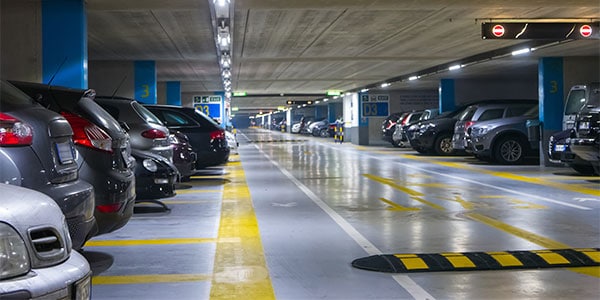
Floor Joint & Crack Filling
Do you need to fix your warehouse floor? You don't have to solve every issue, nor should you. Something like crazing, which is the fine lines that can appear on a concrete floor, probably doesn't need repair. It's likely aesthetic and not causing you structural problems.
Nearly any crack, joint, or surface defect, however, likely needs a serious review. Cracks can appear due to resistance to shrinkage, and heavy forklifts can quickly turn a small split into a dangerous fissure. Joints, the places where two slabs meet, wear down over time. Heavy traffic causes further damage.
Unfilled joints and unplanned cracks can pose tripping hazards and can increase wear and tear on your forklifts and other vehicles. CPC can fill and seal cracks and repair spalling to keep your floor in top working order.
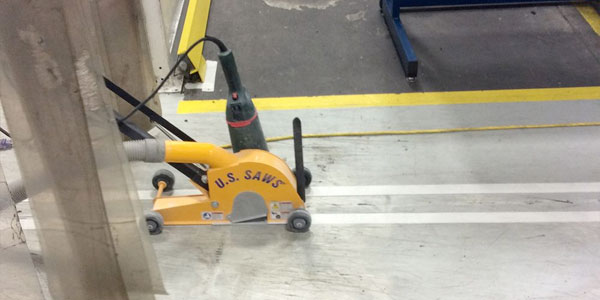
Anti-Slip Flooring
Slips and falls represent the most common injuries in warehouses. People get hurt, productivity drops, and liability goes up when these things happen. A non-slip epoxy floor coating can save you time and money.
Excluding carpet, which is obviously unsuitable for a warehouse, anti-slip flooring comes in two major types: urethane cement and epoxy coatings. Both work well, and one of our flooring experts can help you determine the right choice for your warehouse floor.
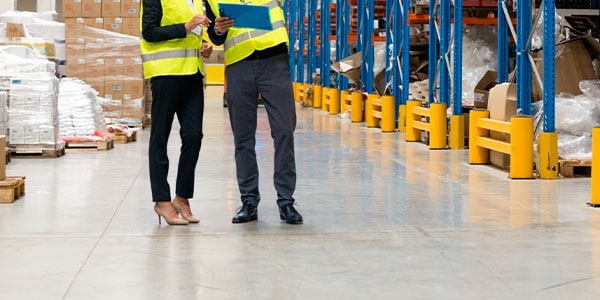
Electrostatic Dissipative Flooring
If your warehouse handles sensitive electronic equipment, stray static shocks can do a lot of damage to your inventory. ESD flooring can keep your investment protected.
What is ESD flooring?
ESD flooring uses conductive elements to lower the floor's resistance, dragging static charge down through the floor. When paired with ESD footwear, poured-in-place polymer ESD floors provide 100% protection in a static electric environment.
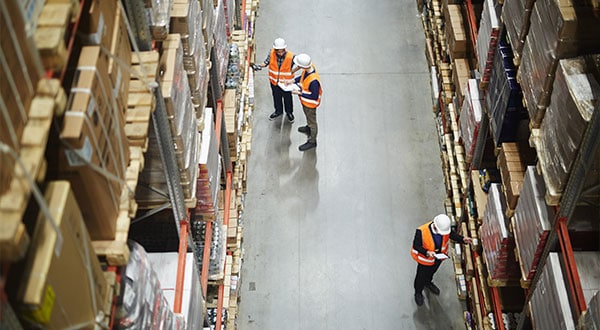
Extreme Chemical Resistant Floor Coatings
Extreme chemical resistant floor coatings coatings can withstand spills from alkalis, solvents, or corrosive acids, and they provide a barrier that keeps floors from soaking up chemical spills.
Chemical resistant floor coatings protect against 98% sulfuric acid, sodium hydroxide, hydrochloric acid, sodium hypochlorite, and nitric acid.
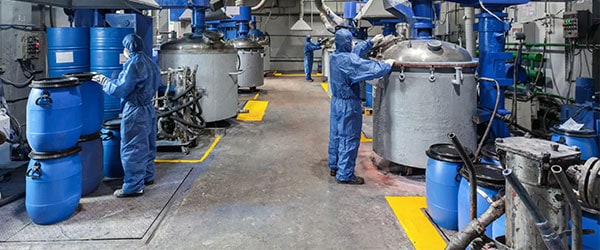
Let's Talk.
Our managers and contractors at CPC Floor Coatings know the industry and have experience with warehouses of all sizes. We can provide specific flooring recommendations based on your unique facility, and we know how to estimate jobs fairly and accurately. Call us for a free consultation at (864) 855-0600 or contact us using the form to the right.








